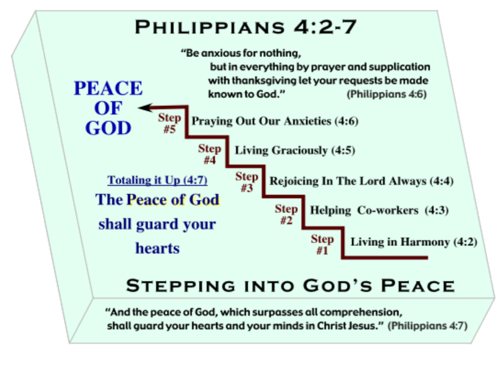
Finding the Peace of God Philippians 4:1-7
– The Bible Teaching Commentary –
Paul J. Bucknell
Overview of Philippians 4:1-9 | The Peace of God Philippians 4:1-7
The God of Peace Philippians 4:8-9 | Handout Philippian s4:1-9

Purpose
Philippians 4:1-7: The Peace of God – a Life Commentary discusses how to find the Peace of God from Philippians 4:1-7 . A diagram/chart is provided that gives detail of the first five steps to find God's peace. This is part two of a three part series on Philippians 4:1-9, Finding the Peace of God.
Phase I: Philippians 4:1-7
Step #1
Living in Harmony (Philippians 4:1-2)
Good relationships are vital. We normally do not think relationships are so important–especially with some people. However, peace comes from love.
The way we relate to man reflects a lot on how we relate with God. However, it is important to recognize that our peace of heart is not derived from these relationships.
"I urge Euodia and I urge Syntyche to live in harmony in the Lord" (4:2).
• Two women perhaps had much to do with the origin of church; meeting places.
• ‘Urge’, Urging because of relationships, easier to offend
Encourage is used twice to not give favor to either.
• To be of an opinion or frame of mind which is characterized by how the Lord would think and carry out things. (Philippians 2:2 -one of humility). Think how the same difference finds unity.
Application
Our plans, minds, hopes and aspirations, whether in leadership or in the body, must come under the scrutiny of the Lord’s humility. Peace can never be thought of as an individualistic possession. Our peace should never be thought of apart from your relationships with others.
This is not to say our peace is gotten from these relationships. The peace God desires is one where we all can mutually grow and work together even if we differ in methods and timing.
How can we have peace when we are not at peace with one another? Especially the influential people in the church whether it is over money, construction, Meeting times or whatever.
- What relationships does God want to work on with you right now?
Step #2
Helping Godly Coworkers (Philippians 4:3)
Give proper respect and assistance to those doing God's work.
The leaders are to lead God's people into God's work, not to do it on their own.
We might have differences, but we are still expected to support God's work rather than to criticize it.
"Indeed, true comrade, I ask you also to help these women who have shared my struggle in the cause of the gospel, together with Clement also, and the rest of my fellow workers, whose names are in the book of life" (Philippians 4:3).
◊ Related to previous, but hits a different spot. Support rather than criticize.
• Yoked together, yokefellow: Paul’s wife, one of the two’s husband, Epaphroditus, Timothy, Silas, Luke, Chief bishop, name “Synzygus”.
Best is comrade -Paul sees the entire church as a unit, as a single individual, who shares with him the apostolic work. -Hawthorne, p. 180.
• Take and bring together, lay hold of , help, assist
• Three groups: These women, Clement, and other laborers for the kingdom.
• Fight together side by side with”. Metaphysical word draw from games in the gladiator’s arena.
Application
-
How can we have peace when we are not actively participating in God's Gospel program? The Gospel was born to be shared with others. Fight apathy.
-
Write a list of leaders God expects you personally to support.
Step #3
Rejoicing in the Lord Always (Philippians 4:4)
Our greatest joy is not in things or circumstances but in the grand person of Jesus Christ. By focusing on His eternal kingdom and holy values we see our greatest service to Him is to cherish and trust Him.
His children are not to focus on how they are treated but on how the Lord has loved them!
"Rejoice in the Lord always; again I will say, rejoice!" (Philippians 4:4).
◊ Finally can focus on self, and yet here as His children focus is on the Lord.
• Rejoice -the action is opposite to what we feel.
• Object -in the Lord
• Duration -always
• Emphasis -”Again I say”
Application
- Come out from under the burdens of our wants and needs and focus on our Lord's grace. Be thankful and rejoice in Him.
Each time you feel critical of something going on, get by yourself and start rejoicing in the Lord till the feelings disappear.
Deceive themselves as even now ‘a quick war’. Media isn’t listening to the army speak. Don’t want to hear.
Step #4
Living Graciously (Philippians 4:5)
We normally equate peace with getting everything we want. But the Lord challenges our notion of 'our rights.'
Instead of focusing on getting what we want, we need to focus on giving love and patience to the very people who threaten our chance of getting what we want.
Peace doesn’t come through demanding our rights but by passing up our rights for the glory of God. Will give us both the strength we need (near) and will take revenge where needed (near).
"Let your forbearing spirit be known to all men. The Lord is near" (Philippians 4:5).
◊ Again the Lord confounds our methods for finding peace by challenging the very thing we think peace is: the fulfillment of our rights. Getting what we want when we should get it. Giving what we should give (even if it is not good like revenge) when we think it ought to be given. God says forbearance.
• Magnanimity -almost untranslatable, sweet reasonableness (II Cor 10:1).
• Scope: “to all men”
• For the Lord is near. Possibly 1) near to me or 2) soon coming
Ps 34:18, 119:151; 145:18. ( Lk 12:42-28)
Application
-
Do you focus on your demands or on being patient and kind with the disagreeable people around you?
-
Can you trust God to take revenge?
Pass on those you have difficulty with to the Lord.
Step #5
Entrusting our Worries to The Lord (Philippians 4:6)
We are first challenged to stop worrying and secondly charged to entrust these worries into God's gracious care.
Worrying is sin that has to be effectively dealt with. Then we can turn temptation into prayer!
"Be anxious for nothing, but in everything by prayer and supplication with thanksgiving let your requests be made known to God" (Philippians 4:6).
◊ Psychologists and many religionists say that it is good to express your anxieties. This is not what God is trying to hint at in this verse. Identifying ones worries is helpful but very limited. Here we are first challenged to stop worrying and secondly charged to entrust them into God’s gracious care.
• Stop worrying. How many of us think worrying is sin. We probably would admit to that fact, but really don’t believe it. Perhaps it is through the many years of experience of tolerating worries or at least realizing your many years of Christian experience has not yet brought you to stop worrying.
• Define worry and anxieties.
• Pray that you worry no more. Knowing God cares and is able to work out the problem whether it is far away from your presence or the very temptation being dragged about in your soul.
Application
- Pick out one or two circumstances that you tend to worry about. Apply this verse now by (1) stop worry about it and (2) letting the Lord know about your needs and trusting Him to care for you.
God is greater than the greatest problem. (cf. Ps 54:22; I Pe 5:7, I Co 7:32.)
Subtotal: Peace of God shall guard your hearts (Philippians 4:7)
.............................................
◊ Peace of God (Only here in NT) if verses 2-6, not just v. 7;
• Peace of God:
- Peace of God is not the same as ‘Peace with God’ (justification as in Rom 5:1)
- Peace of Goddoes not exclusively refer to “inward peace of soul which comes from God” [tou qeou subjective genitive], ‘peace from God’.
- Peace of God is not a peace that is grounded in God’s peace and presence, and a result of believing prayer [Vincent Rom 14:17, 15:13, Col 3:15].
- But Peace of God is the tranquility of God’s own eternal being (Caird), the peace which God himself has (Barth), the calm serenity that characterizes his very nature [tou qeou as a descriptive genitive cf. 4:9; Nu 6:26], God’s peace.
Passes all understanding It surpasses all imaginative; it exceeds all that human wisdom can plan.
Surpass is a participle phrase with 2 meanings:
1) Surpasses all human understanding (GNB, NIV, RSV, Moffatt, Philiips)
2) God’s peace is able to produce exceedingly better results than human planning or that it is far superior to any person’s schemes for security or that it is more effective for removing anxiety than any intellectual effort or power of reasoning. (Plumme)
Guard is a military term picturing God’s peace as a detachment of soldiers standing guard over a city so as to protect it from attack.
Heart in the NT is never used of the physical organ nor solely refer to center of one’s emotions (Ro 9:12, 12:1, II Co 2:9, 6:11; Phl:7). Sometimes the source of thought (Ro 1:21, Ep 1:21) and moral choices (I Co 7:37; II Cor 9:2). That which gives impulses and character to reader.” (Vincent). Here they refer to entire inner being of the Christian, his emotions, affection, thoughts and moral choice.
Application
Dissension and strife are ‘acts of the sinful nature’ (Gal 5:20).
So inner strife resulting from worry will cease.
So external strife resulting from disagreement among Christians will stop.
If we haven’t done what we know we should do, then how are we expect to have a peaceful sleep? Don’t take pills to avoid God’s rebuke. But if have been faithful, trust Him to work it all out.
All five steps are essential in bringing a long lasting peace.
Each area focuses on a particular aspect of our relationship with people, situations or things. As long as we handle these things wrongly, we cannot have peace. But if we do seek God's grace as outlined in these passages, a wonderful peace is assured us. This is described in the next verse.
Let’s look at phase 2: Phase II: Philippians 4:8-9 The God of Peace.
This article is one of many waiting for you to read from the BFF New Testament Library - see below.
Or see BFF's Resource Center for purchasing this low cost Library along with BFF's quality training material. |
info@foundationsforfreedom.net
Scriptures typically quoted from the New American Standard Bible unless noted:
(C) Copyright The Lockman Foundation 1988










